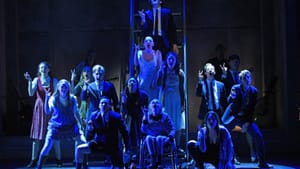Stay in the Loop
BSR publishes on a weekly schedule, with an email newsletter every Wednesday and Thursday morning. There’s no paywall, and subscribing is always free.
A courageous musical revival on Broadway
Deaf West Theatre production of 'Spring Awakening'

It’s early in the theater season for miracles, but we’ve got one already. A company featuring deaf actors is bringing the sound of music to Broadway in a revival even more thrilling than its original production.
The fearless Deaf West Theatre is here with their rousing rendition of Spring Awakening, the 2006 pop-rock adaptation of Franz Wedekind’s 1891 stage play with book by Steven Sater and score by Duncan Sheik. Wedekind’s indictment of the sexual repression in 19th-century Germany was banned at its inception, but its themes find a welcome home in the early 21st century with its celebration of freedom of expression and identity.
Yearning for enlightenment and freedom
True to the original, the musical adaptation focuses on a group of late 19th-century adolescents in a small provincial German town and their parallel journeys from innocence to experience. All are trying to survive in a suffocating society dominated by unfeeling educators and rigid parents. At the same time, they are experiencing urgent sexual awakenings that they are struggling to understand.
Moritz is striving to excel at school, while haunted by erotic fantasies that he can’t control. His friend Melchior, on the other hand, is ready to test the limits that the punishing society is imposing. The innocent young Wendla is also experiencing sexual stirrings, but her mother refuses to enlighten her and keeps her under wraps. Ilse, in contrast, is homeless, having been thrown out of the house for alleged promiscuity by her cruel parents. This quartet is surrounded by an ensemble of other eager young souls, yearning for enlightenment and freedom.
Double casting
The wonder of the current Broadway revival is that it’s being performed by a 27-member company that consists of deaf actors as well as hearing ones. Under Michael Arden’s inspired direction, some of the principal roles are double cast. Moritz, for example, is played by Daniel Durant (a deaf actor), while his lines and songs are delivered by actor Alex Boniello. The lovely Wendla is played by Sandra Mae Frank (a deaf actress), followed around the stage by Katie Boeck, who delivers Wendla’s lines and sings her songs while playing the guitar. Then there’s Marlee Matlin, the company’s founder and a celebrated deaf actress, who plays a number of the adult roles.
Other roles, like Melchior and Ilse, are played by singing/speaking actors (Austin McKenzie and Krysta Rodriguez, respectively). The rest of the ensemble consists largely of hearing actors who sing and speak, while also signing in American Sign Language. There are moments when this signed dialogue is projected on an upstage blackboard.
An exhilarating experience
At first, it’s a lot to take in. You may need a few minutes to acclimate yourself, as your attention is immediately divided between the paired performers, the ensemble, and the upstage screen. But once you adjust, the payoff is thrilling, as you get double-pleasure hearing Katie Boeck’s sweet singing (as Wendla) while you focus on the luminous, expressive face of Sandra Mae Frank. Indeed, the combined energy of all these young actors, deaf and hearing (including one actress in a wheelchair), is exhilarating.
Thanks to Arden’s dynamic direction and Spencer Liff’s creative choreography, the story unfolds on a three-level set (designed by Dane Laffrey) with remarkable energy and speed. A few of these brave young adolescents will triumph, while others will perish under the yoke of societal oppression. And yet to watch it all is a joyous experience. The courage of Deaf West Theatre in overcoming obstacles and embracing theater and life fully represents one of the most thrilling triumphs of the human spirit I’ve ever seen on stage.
In the program notes, director Arden explains that the banning of the original Spring Awakening in 1891 coincided with the banning of sign language in schools across Europe and America. Deaf students were told that “if they failed at speech, they failed at life.” Deaf West’s Spring Awakening challenges such an inhuman chapter in history, offering instead a celebration of life and freedom of expression shared by all — just as Wedekind had intended.
What, When, Where
Spring Awakening, adaptation of Franz Wedekind’s play with book by Steven Sater and score by Duncan Sheik. Michael Arden directed. Deaf West Theatre production, through January 24, 2016 at the Brooks Atkinson Theatre, 256 West 47th Street, New York. springawakeningthemusical.com
Sign up for our newsletter
All of the week's new articles, all in one place. Sign up for the free weekly BSR newsletters, and don't miss a conversation.
